
Animal Crossing is a social simulation video game series developed and published by Nintendo. The series was conceptualized and created by Katsuya Eguchi and Hisashi Nogami. In Animal Crossing, the player character is a human who lives in a village inhabited by various anthropomorphic animals and can do various activities like fishing, insect catching, and fossil hunting. The series is notable for its open-ended gameplay and use of the video game console's internal clock and calendar to simulate real passage of time.
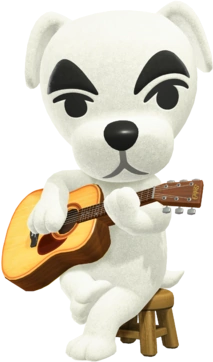
Totakeke, more commonly known as K.K. Slider or K.K., is a fictional character within the Animal Crossing franchise. One of the franchise's most popular characters, he debuted in the title Animal Crossing, and has appeared in every installment since. K.K.'s main role is as a musician who performs to the townsfolk, through live performances and purchasable in-game albums. He is based on Nintendo video game voice actor and composer Kazumi Totaka – his Japanese nickname "Totakeke" being a contraction of "Totaka K." – and has been said to be an animal caricature of Totaka.

Animal Crossing: New Leaf is a 2012 social simulation game developed and published by Nintendo for the Nintendo 3DS. In the game, the player controls a human character who takes on the role of mayor in a town populated with anthropomorphic animals. As the fourth main title in the Animal Crossing series, it was released in Japan in November 2012, and in 2013 in international territories.
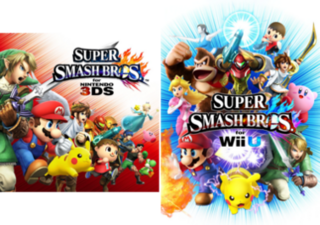
Super Smash Bros. for Nintendo 3DS and Super Smash Bros. for Wii U, both commonly referred together as Super Smash Bros. 4, are 2014 crossover platform fighter video games developed by Bandai Namco Studios and Sora Ltd. and published by Nintendo for the Nintendo 3DS and Wii U video game consoles. It is the fourth installment in the Super Smash Bros. series, succeeding Super Smash Bros. Brawl. The Nintendo 3DS version was released in Japan on September 13, 2014, and in North America, Europe, and Australia the following month. The Wii U version was released in North America, Europe, and Australia in November 2014 and in Japan the following month.
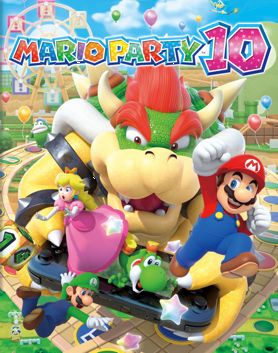
Mario Party 10 is a 2015 party video game developed by NDcube and published by Nintendo for the Wii U video game console. It is the tenth home console release in the Mario Party series and a part of the larger Mario franchise. Featuring gameplay similar to the prior series entries, players compete against each other and computer-controlled characters to collect the most mini-stars, traversing a game board and engaging in minigames and other challenges. There are multiple game modes, including one where players traverse a board in a vehicle, sabotaging each other and making choices to collect the most mini-stars by the end. Mario Party 10 adds two modes over its predecessors: Bowser Party, where four players compete in a team against a fifth who controls Bowser on the Wii U GamePad, and Amiibo Party, where players use Amiibo figures. Their gameplay is interspersed by over 70 minigames with various play styles.

Mario vs. Donkey Kong is a crossover spin-off video game series of both the Mario and Donkey Kong franchises, based on puzzle platforming, marking the return of Pauline and the rivalry between Mario and Donkey Kong.

Super Mario Maker is a 2015 side-scrolling platform game and game creation system developed and published by Nintendo for the Wii U, released worldwide in September 2015. Players can create, play, and share courses online, free of charge, based on the styles of Super Mario Bros., Super Mario Bros. 3, Super Mario World, and New Super Mario Bros. U. The game was revealed as the final challenge of Nintendo World Championships 2015.
Amiibo is a toys-to-life platform by Nintendo, which was launched in November 2014. It consists of a wireless communications and storage protocol for connecting figurines to the Wii U, Nintendo 3DS, and Nintendo Switch video game consoles. These figurines are similar in form and functionality to that of the Skylanders, Disney Infinity and Lego Dimensions series of toys-to-life platforms. The Amiibo platform was preannounced to potentially accommodate any form of toy, specifically including general plans for future card games. Amiibo use near field communication (NFC) to interact with supported video game software, potentially allowing data to be transferred in and out of games and across multiple platforms.
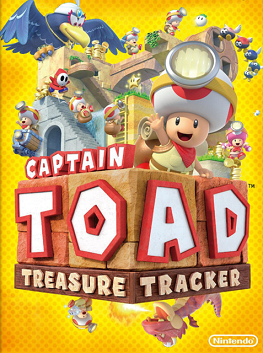
Captain Toad: Treasure Tracker is a 2014 action puzzle video game developed and published by Nintendo for the Wii U. The game was re-released for the Nintendo Switch and Nintendo 3DS in 2018 with additional content. It is a spin-off of the Super Mario series and a part of the larger Mario franchise. The game stars Captain Toad and Toadette as they complete levels and save each other from the antagonist Wingo. Each level is contained within a miniature diorama-like environment that requires puzzle-solving and platforming challenges to complete. The player also uses the Wii U GamePad to rotate the camera and reveal new information and interact with the environment.

Kirby and the Rainbow Curse, known in PAL regions as Kirby and the Rainbow Paintbrush, is a platforming video game in the Kirby series, developed by HAL Laboratory and published by Nintendo for Wii U. The title, which is a follow-up game of the 2005 Nintendo DS title Kirby: Canvas Curse, was released by Nintendo on January 22, 2015, in Japan, February 20, 2015, in North America, May 8, 2015, in Europe, and May 9, 2015, in Australia. The game supports the Kirby, Meta Knight, and King Dedede Amiibo.

Splatoon is a 2015 third-person shooter video game developed and published by Nintendo for the Wii U. The game centers around Inklings—anthropomorphic cephalopodic lifeforms that can transform between humanoid and cephalopod forms and frequently engage in turf wars with each other and use a variety of weapons that produce and shoot colored ink while in humanoid form, or swim and hide in surfaces covered in their own colored ink while in their cephalopodic forms. Splatoon features several different game modes, including four-on-four online multiplayer and a single player campaign.

Yoshi's Woolly World is a 2015 platform game developed by Good-Feel and published by Nintendo for the Wii U. The game is the seventh main entry in the Yoshi series of games, the first home console title in the series since 1997's Yoshi's Story, as well as the spiritual successor to 2010's Kirby's Epic Yarn. The game was released worldwide throughout 2015. A port for the Nintendo 3DS, known as Poochy & Yoshi's Woolly World, was released worldwide in early 2017. Both versions received generally favorable reviews, with reviewers praising the art style, gameplay, and innovation, but critiquing the lack of difficulty.

Star Fox Zero is a 3D rail shooter video game developed by Nintendo and PlatinumGames for the Wii U. It is the sixth installment in the Star Fox series. Formally announced at E3 2015, the game was released in April 2016 to mixed critical reception, with the most polarizing aspect of the game being its control scheme. A standalone tower defense game, titled Star Fox Guard, was bundled with the game.
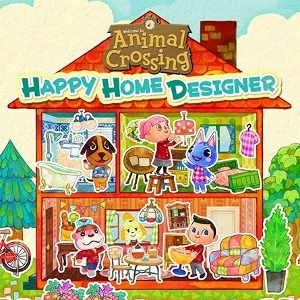
Animal Crossing: Happy Home Designer is a 2015 sandbox video game developed and published by Nintendo, with assistance from Monolith Soft, for the Nintendo 3DS. The game was released in Japan in July 2015, in North America in September 2015, and in PAL regions in October 2015. The game is a spin-off of the Animal Crossing series where the player has to design homes for various anthropomorphic animal characters. The game received mixed reviews from critics upon release, praising the creative freedom and improved design controls, but criticizing the lack of challenge, lack of reward, and the game not being DLC for Animal Crossing: New Leaf, and has sold 3.04 million copies worldwide as of March 2016.

Mario Tennis: Ultra Smash is a 2015 tennis video game in the Mario Tennis series developed by Camelot Software Planning and published by Nintendo for the Wii U, released internationally in November 2015, and released in Japan in January 2016. It is the first Mario Tennis game to feature simultaneous online worldwide multiplayer. The game received mixed reviews from critics; it was criticized for a lack of additional modes, its smaller character roster than prior entries, and a perceived lack of enough innovation, with many deeming the game to be inferior to previous installments in terms of content, although its visual presentation, gameplay, and multiplayer were praised.

Nintendo Entertainment Planning & Development Division, commonly abbreviated as Nintendo EPD, is the largest division within the Japanese video game company Nintendo. The division focuses on developing and producing video games, mobile apps, and other related entertainment software for the company. EPD was created after merging their Entertainment Analysis & Development (EAD) and Software Planning & Development (SPD) divisions in September 2015.

Mini Mario & Friends: Amiibo Challenge is a puzzle video game developed and published by Nintendo for the Wii U and Nintendo 3DS. The game was free to download on the Nintendo eShop, but requires Nintendo's Amiibo lineup in order to play. It was released in Japan in January 2016 and worldwide in April.
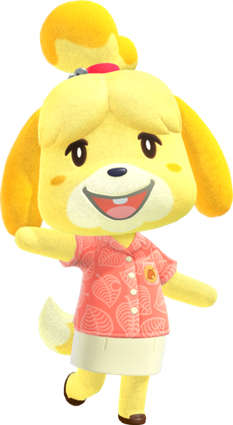
Isabelle, known as Shizue (しずえ) in Japan, is a fictional character from the Animal Crossing series of video games. She is a gentle Shih Tzu that debuted in the 2012 release Animal Crossing: New Leaf, where she serves as the secretary to the player character.
Aya Kyogoku is a Japanese video game director and producer. She is the current manager of Nintendo's Entertainment Planning & Development (EPD) Production Group No. 5, which oversees the Animal Crossing, Splatoon, and Wii Sports franchises. Kyogoku is best known for her work on Animal Crossing, where she has alternately served as a producer, director, and supervisor since 2008.


















